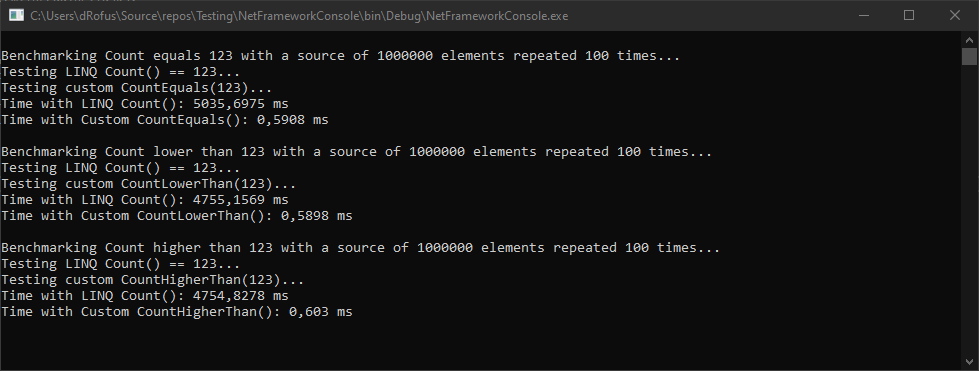Last active
March 26, 2023 01:00
-
-
Save Alvtron/ee38a907b34d8ea86b888b166df84b87 to your computer and use it in GitHub Desktop.
Enumerable extensions for faster count checking instead of using the built in .Count() extension method.
This file contains hidden or bidirectional Unicode text that may be interpreted or compiled differently than what appears below. To review, open the file in an editor that reveals hidden Unicode characters.
Learn more about bidirectional Unicode characters
| public static class EnumerableCountExtensions | |
| { | |
| /// <summary> | |
| /// Check if the number of elements in the source is equal to the specified count. | |
| /// </summary> | |
| /// <remarks> | |
| /// This will never exhaust the source past the necessary number of elements. | |
| /// This is in almost all circumstances faster than .Count() == x, where x is an arbitrary <see cref="int"/>.<br/> | |
| /// If the source is a sequence that implements <see cref="ICollection{TSource}"/>, the Count-property is used instead. | |
| /// </remarks> | |
| /// <typeparam name="TSource">The element type in the source.</typeparam> | |
| /// <param name="source">The source of elements.</param> | |
| /// <param name="count">The number of elements that is checked.</param> | |
| /// <returns>True if the number of elements in the source is identical to the specified count; false otherwise.</returns> | |
| public static bool CountEquals<TSource>(this IEnumerable<TSource> source, int count) | |
| { | |
| if (source is null) | |
| { | |
| throw new ArgumentNullException(nameof(source)); | |
| } | |
| if (count < 0) | |
| { | |
| return false; | |
| } | |
| if (source is ICollection<TSource> collection) | |
| { | |
| return collection.Count == count; | |
| } | |
| if (count == 0) | |
| { | |
| return !source.Any(); | |
| } | |
| using var enumerator = source.Skip(count - 1).GetEnumerator(); | |
| return enumerator.MoveNext() && !enumerator.MoveNext(); | |
| } | |
| /// <summary> | |
| /// Check if the number of elements in the source is higher than the specified count. | |
| /// </summary> | |
| /// <remarks> | |
| /// This will never exhaust the source past the necessary number of elements. | |
| /// This is in almost all circumstances faster than .Count() > x, where x is an arbitrary <see cref="int"/>.<br/> | |
| /// If the source is a sequence that implements <see cref="ICollection{TSource}"/>, the Count-property is used instead. | |
| /// </remarks> | |
| /// <typeparam name="TSource">The element type in the source.</typeparam> | |
| /// <param name="source">The source of elements.</param> | |
| /// <param name="count">The number of elements that is checked.</param> | |
| /// <returns>True if the number of elements in the source is higher than the specified count; false otherwise.</returns> | |
| public static bool CountHigherThan<TSource>(this IEnumerable<TSource> source, int count) | |
| { | |
| if (source is null) | |
| { | |
| throw new ArgumentNullException(nameof(source)); | |
| } | |
| if (count < 0) | |
| { | |
| return true; | |
| } | |
| if (source is ICollection<TSource> collection) | |
| { | |
| return collection.Count > count; | |
| } | |
| return source.Skip(count).Any(); | |
| } | |
| /// <summary> | |
| /// Check if the number of elements in the source is lower than the specified count. | |
| /// </summary> | |
| /// <remarks> | |
| /// This will never exhaust the source past the necessary number of elements. | |
| /// This is in almost all circumstances faster than .Count() < x, where x is an arbitrary <see cref="int"/>.<br/> | |
| /// If the source is a sequence that implements <see cref="ICollection{TSource}"/>, the Count-property is used instead. | |
| /// </remarks> | |
| /// <typeparam name="TSource">The element type in the source.</typeparam> | |
| /// <param name="source">The source of elements.</param> | |
| /// <param name="count">The number of elements that is checked.</param> | |
| /// <returns>True if the number of elements in the source is lower than the specified count; false otherwise.</returns> | |
| public static bool CountLowerThan<TSource>(this IEnumerable<TSource> source, int count) | |
| { | |
| if (source is null) | |
| { | |
| throw new ArgumentNullException(nameof(source)); | |
| } | |
| if (count < 1) | |
| { | |
| return false; | |
| } | |
| if (source is ICollection<TSource> collection) | |
| { | |
| return collection.Count < count; | |
| } | |
| return !source.Skip(count - 1).Any(); | |
| } | |
| } |
Sign up for free
to join this conversation on GitHub.
Already have an account?
Sign in to comment
Testing with enumerable source:

Testing with list source:
